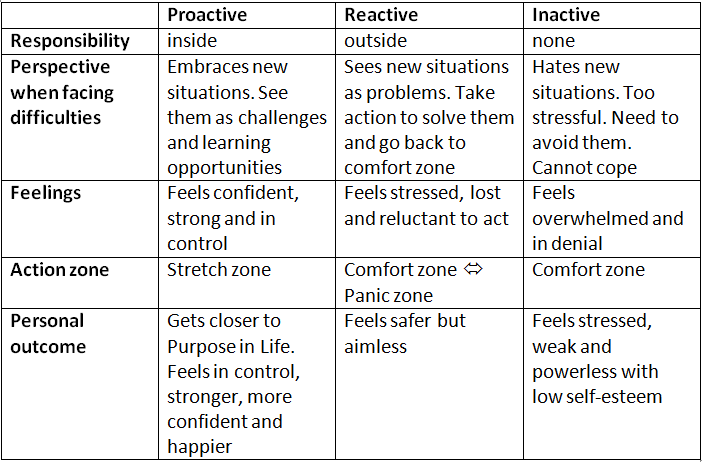A Coaching Power Tool created by Sylvia Gautier
(Life and Wellness Coach, UK)
Life opens up opportunities to you, and you either take them or you stay afraid of taking them. Jim Carrey
Reading
Being proactive is acting in advance, before a situation becomes a problem. It is about causing something to happen instead of waiting for it to happen. Many people see being proactive as acting before problems arise but it is also possible to be proactive when dealing with problems. In such a case, being proactive consists in turning difficult situations into opportunities and in understanding how the changes we have to make in our lives as a result can actually improve our life overall.
Proactive people take responsibility for what they do and for the way they do it. They make choices and act on them. They make the best of each situation, learn from it and seize the opportunities available to them in order to have a more fulfilled life.
On the other hand, being reactive is about dealing with situations when they happen because it seems that there is no choice. Reactive people dread difficult situations and changes because they lack the confidence that they can manage them. They feel like victims and struggle to sort out these situations. They often feel stressed and overwhelmed. They tend to solve a problem as quickly as possible so that they can go back to their lives.
A third way to react to a difficult situation is not to act. In that case, a person faced with such a situation would either procrastinate, think that the problem is too difficult to be overcome, or be in denial and try to pretend that the problem does not exist. The focus here is on active people, so that the inactive behavior is introduced only as a matter of completeness.
People are not proactive or reactive in every situation. The context of the issue can affect the way they act to sort it out. As a consequence, people can act proactively in certain instances and be reactive in others. When you are proactive, you gain experience that can enlarge your comfort zone. It then becomes easier to act proactively in the future. On the opposite, being reactive may decrease one’s ability to cope with change, so that it becomes harder to be proactive in the future. In the long run, reactivity can increase procrastination and lead to being inactive when facing more challenging difficulties.
The following table compares the proactive, reactive and inactive behaviours with a focus on the state of mind of the person engaged in those behaviours.
